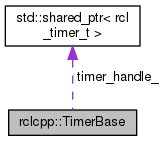#include <timer.hpp>
◆ TimerBase()
| rclcpp::TimerBase::TimerBase |
( |
Clock::SharedPtr |
clock, |
|
|
std::chrono::nanoseconds |
period, |
|
|
rclcpp::Context::SharedPtr |
context |
|
) |
| |
|
explicit |
◆ ~TimerBase()
| rclcpp::TimerBase::~TimerBase |
( |
| ) |
|
◆ cancel()
| void rclcpp::TimerBase::cancel |
( |
| ) |
|
◆ is_canceled()
| bool rclcpp::TimerBase::is_canceled |
( |
| ) |
|
Return the timer cancellation state.
- Returns
- true if the timer has been cancelled, false otherwise
- Exceptions
-
| std::runtime_error | if the rcl_get_error_state returns 0 |
| RCLErrorBase | some child class exception based on ret |
◆ reset()
| void rclcpp::TimerBase::reset |
( |
| ) |
|
◆ execute_callback()
| virtual void rclcpp::TimerBase::execute_callback |
( |
| ) |
|
|
pure virtual |
◆ get_timer_handle()
◆ time_until_trigger()
Check how long the timer has until its next scheduled callback.
- Returns
- A std::chrono::duration representing the relative time until the next callback.
◆ is_steady()
| virtual bool rclcpp::TimerBase::is_steady |
( |
| ) |
|
|
pure virtual |
◆ is_ready()
| bool rclcpp::TimerBase::is_ready |
( |
| ) |
|
Check if the timer is ready to trigger the callback.
This function expects its caller to immediately trigger the callback after this function, since it maintains the last time the callback was triggered.
- Returns
- True if the timer needs to trigger.
◆ clock_
| Clock::SharedPtr rclcpp::TimerBase::clock_ |
|
protected |
◆ timer_handle_
The documentation for this class was generated from the following file:


 1.8.13
1.8.13